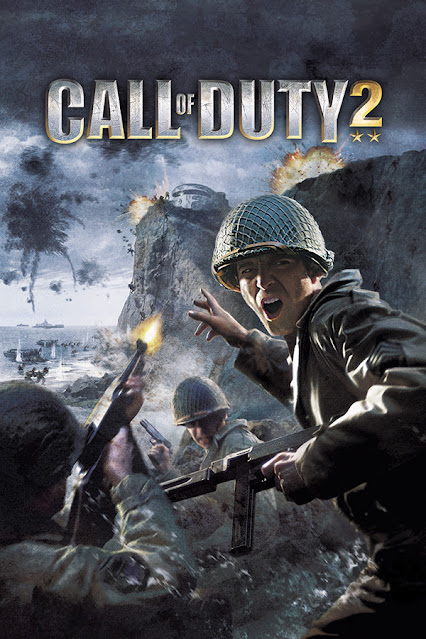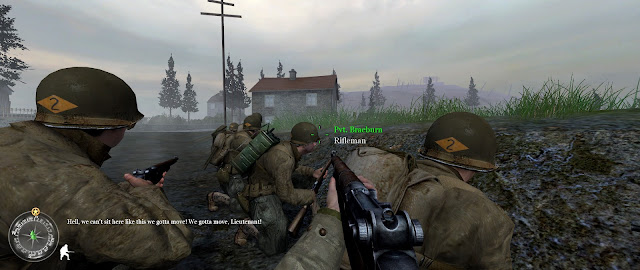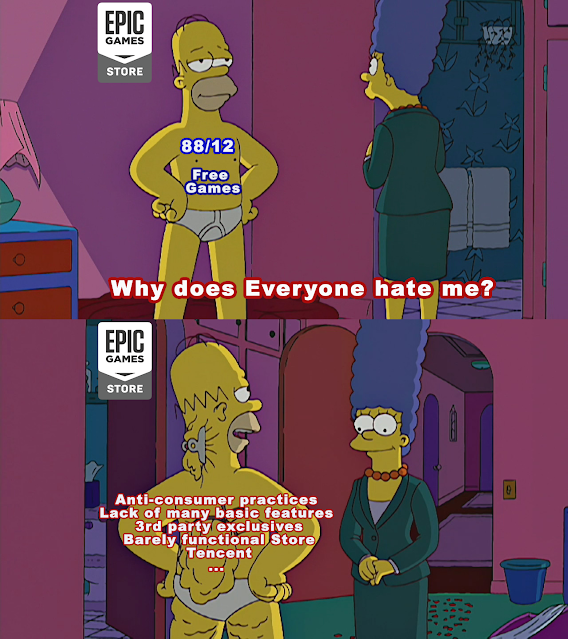Call of Duty 2 mimicked it's predecessor somewhat in so far as it featured not one central protagonist as most other games but gave you slices of the war through the eyes of several fictional soldiers who fought with real units in dramatized but historically researched encounters. For the Russian campaign, you are Private Vasili Koslov of the 13th Guards Rifle Division, who after the defence of Moscow takes part in the final assault to recapture Stalingrad in 1943. As Sergeant John Davis of the 7th Armoured Division in North Africa you assault the trenches and machine gun nests in the Second Battle of El Alamein in 1942 later taking the role of British tank commander, David Welsh, engaging German forces in Libya. Finally you are Corporal Bill Taylor of the 2nd Ranger Battalion who climbs to assault Pointe du Hoc on D-Day, later takes Hill 400 and finally the Rhine River crossing in 1945.
As with Call of Duty there is no suggestion that you win WW2 all by yourself, you are constantly supported (or sometimes hindered by the AI of) your ever-present squadmates. If you are sent somewhere alone it's literally into a bunker or a building to shoot a bunch of Jerries, your team mates are less than 30 feet from you if not shooting and throwing grenades into buildings. There is an active "chatter system" where both friendly and enemy soldiers will call out the position of each other as they shoot. And shoot you will, you are once again restricted to being able to hold just two weapons such as a Lee Enfield and a Sten Gun, while you will eventually run out of "allied ammo" as you progress, one does best to pick up a German rifle and a machine gun for both far and closer-range enemies.
Final Verdict: Call of Duty 2 brought more dramatic realism to the WW2 FPS genre using carefully researched locations and astounding development technology to bring a teeth rattling, visceral experience though awesome sound and breathtaking visuals. While obviously aged Call of Duty 2 surpassed what came before and was as one would expect, surpassed by it's later successors. It was the best of it's time but is still great to look back on a fun shooter in 2022.
Technicals: 7 hours (approx) playtime using a Nvidia 3070Ti @ 3440x1440 with max settings on Windows 11. Windows HDR provided a negligible amount of superior lighting.
Bugs: None.
Call of Duty 2 suffers from the same prohibiting issue as it's predecessor in that it is available from Steam for €19.99 which for a 17 year old game is fucking ridiculous. This is the worst thing I've personally experienced with Activision - while the game certainly was worth the full price in 2005, today most 17+ year old games are under €5 when on sale but the pricing of Call of Duty franchise, even when the maximum 50% off remains premium and thus prohibitive to this day.
Series (PC Only):
Call of Duty [2003]
- Call of Duty: United Offensive [2004]
Call of Duty 2 [2005]
Call of Duty 4: Modern Warfare [2007]
Call of Duty: World at War [2008]
Call of Duty: Modern Warfare 2 [2009]
Call of Duty: Black Ops [2010]
Call of Duty: Modern Warfare 3 [2011]
Call of Duty: Black Ops II [2012]
Call of Duty: Ghosts [2013]
Call of Duty: Advanced Warfare [2014]
Call of Duty: Black Ops III [2015]
Call of Duty: Infinite Warfare [2016]
- Call of Duty: Modern Warfare Remastered [2016]
Call of Duty: WWII [2017]
Call of Duty: Black Ops 4 [2018]
Call of Duty: Modern Warfare [2019]
Call of Duty: Black Ops Cold War [2020]
- Call of Duty: Modern Warfare 2 Campaign Remastered [2020]
Call of Duty: Vanguard [2021]
Call of Duty: Modern Warfare II [2022]













